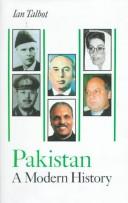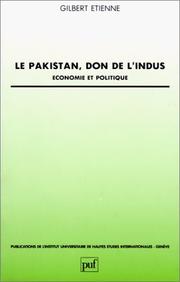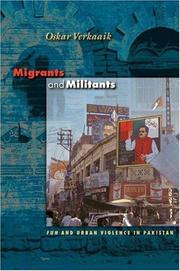| Listing 1 - 9 of 9 |
Sort by
|

ISBN: 1850653852 Year: 1998 Publisher: London : Hurst,
Abstract | Keywords | Export | Availability | Bookmark
 Loading...
Loading...Choose an application
- Reference Manager
- EndNote
- RefWorks (Direct export to RefWorks)
Book
ISBN: 0415057973 Year: 1991 Publisher: London New York Routledge
Abstract | Keywords | Export | Availability | Bookmark
 Loading...
Loading...Choose an application
- Reference Manager
- EndNote
- RefWorks (Direct export to RefWorks)

ISBN: 2130422683 2940549621 9782130422686 Year: 1989 Volume: vol *11 Publisher: Paris: PUF,
Abstract | Keywords | Export | Availability | Bookmark
 Loading...
Loading...Choose an application
- Reference Manager
- EndNote
- RefWorks (Direct export to RefWorks)
Le Pakistan joue un rôle clé sur un échiquier géopolitique particulièrement mouvant, à la jonction du Moyen-Orient et du monde indien. Ce livre poursuit plusieurs buts : tout d’abord présenter le Pakistan dans une perspective historique. Il y a au moins cinq mille ans commence cette extraordinaire aventure qui se poursuit aujourd’hui : la transformation du désert en espace vert grâce à l’Indus et au plus formidable système de canaux d’irrigation jamais créé dans le monde. En 1987, le Pakistan a célébré son quarantième anniversaire, moment que choisit l'auteur pour dresser un bilan d'étape de ce nouvel État. Ce livre éclaire la toile de fond sur laquelle se déroulent la vie politique et économique du Pakistan et comment il se situe par rapport à d’autres pays d’Asie. Un livre de référence sur le Pakistan.
Pakistan --- Politics and government --- Economic conditions --- Business & Economics --- Economic History --- 308 <549> --- Economic conditions. --- -Business & Economics --- 1971 --- -Pakistan --- Pakistan - Politics and government - 1971-1988 --- Pakistan - Economic conditions --- Etat | nation --- économie rurale --- environnement et ressources naturelles --- développement rural
Book
ISBN: 9781107032965 9781139519076 1139519077 1107327075 1107238137 1107332729 110733683X 1107333512 1107335175 1299399940 1107336007 9781107333512 9781107336834 9781107335172 1107032962 9781299399945 1316635244 Year: 2013 Publisher: Cambridge : Cambridge University Press,
Abstract | Keywords | Export | Availability | Bookmark
 Loading...
Loading...Choose an application
- Reference Manager
- EndNote
- RefWorks (Direct export to RefWorks)
Under what conditions are some developing countries able to create stable democracies while others have slid into instability and authoritarianism? To address this classic question at the center of policy and academic debates, The Promise of Power investigates a striking puzzle: why, upon the 1947 Partition of British India, was India able to establish a stable democracy while Pakistan created an unstable autocracy? Drawing on interviews, colonial correspondence, and early government records to document the genesis of two of the twentieth century's most celebrated independence movements, Maya Tudor refutes the prevailing notion that a country's democratization prospects can be directly attributed to its levels of economic development or inequality. Instead, she demonstrates that the differential strengths of India's and Pakistan's independence movements directly account for their divergent democratization trajectories. She also establishes that these movements were initially constructed to pursue historically conditioned class interests. By illuminating the source of this enduring contrast, The Promise of Power offers a broad theory of democracy's origins that will interest scholars and students of comparative politics, democratization, state-building, and South Asian political history.
Democracy --- Authoritarianism --- India --- Pakistan --- Politics and government --- Democracy. --- Authoritarianism. --- Political science --- Authority --- Self-government --- Equality --- Representative government and representation --- Republics --- Politics and government. --- Social Sciences --- Political Science --- India - Politics and government - 1947 --- -Pakistan - Politics and government
Book
ISBN: 9781107623590 9781107045460 9781107053755 1107623596 1107045460 1107053757 1107425808 Year: 2013 Publisher: New York: Cambridge university press,
Abstract | Keywords | Export | Availability | Bookmark
 Loading...
Loading...Choose an application
- Reference Manager
- EndNote
- RefWorks (Direct export to RefWorks)
This book tells the story of the tragic and often tormented relationship between the United States and Pakistan. Pakistan's internal troubles have already threatened US security and international peace, and Pakistan's rapidly growing population, nuclear arsenal, and relationships with China and India will continue to force it upon America's geostrategic map in new and important ways over the coming decades. This book explores the main trends in Pakistani society that will help determine its future; traces the wellsprings of Pakistani anti-American sentiment through the history of US-Pakistan relations from 1947 to 2001; assesses how Washington made and implemented policies regarding Pakistan since the terrorist attacks on the United States on September 11, 2001; and analyzes how regional dynamics, especially the rise of China, will likely shape US-Pakistan relations. It concludes with three options for future US strategy, described as defensive insulation, military-first cooperation, and comprehensive cooperation.
Anti-Americanism --- United States --- Pakistan --- Foreign relations --- Politics and government --- Strategic aspects --- Anti-amerikanisme --- Anti-Americanism - Pakistan --- United States - Foreign relations - Pakistan --- Pakistan - Foreign relations - United States --- Pakistan - Politics and government --- Pakistan - Strategic aspects --- Politics and government. --- Strategic aspects.
Book
ISBN: 1282940368 9786612940361 0833049860 0833049763 9780833049865 9780833049766 Year: 2010 Publisher: Santa Monica, CA : RAND,
Abstract | Keywords | Export | Availability | Bookmark
 Loading...
Loading...Choose an application
- Reference Manager
- EndNote
- RefWorks (Direct export to RefWorks)
Pakistan has undertaken a number of operations against militant groups since 2001. There have been some successes, but such groups as al Qa'ida continue to present a significant threat to Pakistan, the United States, and other countries. Pakistan needs to establish a population-centric counterinsurgency that better protects the local population and addresses grievances. It also needs to abandon militancy as a tool of foreign and domestic policy.
Counterinsurgency -- Pakistan. --- Pakistan -- Politics and government -- 1988-. --- Counterinsurgency --- Regions & Countries - Asia & the Middle East --- South Asia --- History & Archaeology --- Pakistan --- Politics and government --- Counterguerrilla warfare --- #SBIB:328H56 --- Instellingen en beleid: Pakistan --- #SBIB:327.5H21Instellingen en beleid: Pakistan --- Guerrilla warfare --- Insurgency --- #SBIB:327.5H21 --- Vrede – oorlog, oorlogssituaties
Book
ISBN: 1108601316 1108609163 1108497446 9781108497442 9781108609166 Year: 2019 Publisher: Cambridge: Cambridge university press,
Abstract | Keywords | Export | Availability | Bookmark
 Loading...
Loading...Choose an application
- Reference Manager
- EndNote
- RefWorks (Direct export to RefWorks)
"Delusional States is the first in-depth study of state-making and social change in Gilgit-Baltistan, a Shia-majority region of Sunni-dominated Pakistan and a contested border area that forms part of disputed Kashmir. For over seven decades, the territorial conflict over Kashmir has locked India and Pakistan in brutal wars and hate-centred nationalisms. The book illuminates how within this story of hate lie other stories -- of love and betrayal, loyalty and suspicion, beauty and terror -- that help us grasp how the Kashmir conflict is affectively structured and experienced on the ground. Placing these emotions at the centre of its analysis, the book rethinks the state-citizen relation in deeply felt and intimate terms, offering a multi-layered ethnographic understanding of power and subjection in contemporary Pakistan"--
Gilgit District (Pakistan) --- Baltistan District (Pakistan) --- Gilgit Agency (Pakistan) --- Gilgit --- Politics and government. --- Conflict management - India - Jammu and Kashmir --- Nationalism - Pakistan --- Nationalism - India --- Islam - Pakistan --- Gilgit-Baltistān (Pakistan) - History --- Gilgit-Baltistān (Pakistan) - Social conditions --- Gilgit-Baltistān (Pakistan) - Politics and government --- Jammu and Kashmir (India) - History --- Jammu and Kashmir (India) - Politics and government --- Pakistan - Foreign relations - India --- India - Foreign relations - Pakistan --- Conflict management --- Nationalism --- Islam --- Gilgit-Baltistān (Pakistan) --- Jammu and Kashmir (India) --- Pakistan --- India

ISBN: 069111708X 0691117098 9780691117089 9780691117096 0691187711 Year: 2004 Publisher: Princeton (N.J.): Princeton university press,
Abstract | Keywords | Export | Availability | Bookmark
 Loading...
Loading...Choose an application
- Reference Manager
- EndNote
- RefWorks (Direct export to RefWorks)
Muhajir (Pakistani people) --- Political violence --- Islam and politics --- Ethnicity --- Politics and government --- Muhājir Qaumī Mūvmenṭ --- Pakistan --- #SBIB:39A6 --- #SBIB:39A75 --- Etniciteit / Migratiebeleid en -problemen --- Etnografie: Azië --- Violence --- Political crimes and offenses --- Terrorism --- Mohajir (Pakistani people) --- Ethnology --- Ethnic identity --- Group identity --- Cultural fusion --- Multiculturalism --- Cultural pluralism --- Muhājir Qaumī Mūvmenṭ. --- Em. Kiyū. Em. --- MQM --- M.Q.M. --- Mohajir Qaumi Movement --- Muhājir Qaumī Mūvmanṭ --- Muttahida Quami Movement --- Politics and government. --- Muhajir (Pakistani people) - Politics and government --- Political violence - Pakistan --- Islam and politics - Pakistan --- Ethnicity - Pakistan --- Pakistan - Politics and government
Book
ISBN: 0674419774 0674419766 9780674419766 9780674728936 0674728939 9780674419773 Year: 2014 Publisher: Cambridge, MA : Harvard University Press,
Abstract | Keywords | Export | Availability | Bookmark
 Loading...
Loading...Choose an application
- Reference Manager
- EndNote
- RefWorks (Direct export to RefWorks)
Since Pakistan gained independence in 1947, only once has an elected government completed its tenure and peacefully transferred power to another elected government. In sharp contrast to neighboring India, the Muslim nation has been ruled by its military for over three decades. Even when they were not directly in control of the government, the armed forces maintained a firm grip on national politics. How the military became Pakistan's foremost power elite and what its unchecked authority means for the future of this nuclear-armed nation are among the crucial questions Aqil Shah takes up in The Army and Democracy. Pakistan's and India's armies inherited their organization, training, and doctrines from their British predecessor, along with an ethic that regarded politics as outside the military domain. But Pakistan's weak national solidarity, exacerbated by a mentality that saw war with India looming around every corner, empowered the military to take national security and ultimately government into its own hands. As the military's habit of disrupting the natural course of politics gained strength over time, it arrested the development of democratic institutions. Based on archival materials, internal military documents, and over 100 interviews with politicians, civil servants, and Pakistani officers, including four service chiefs and three heads of the clandestine Inter-Services Intelligence, The Army and Democracy provides insight into the military's contentious relationship with Pakistan's civilian government. Shah identifies steps for reforming Pakistan's armed forces and reducing its interference in politics, and sees lessons for fragile democracies striving to bring the military under civilian control.
Civil-military relations --- Democracy --- Military and civilian power --- Military-civil relations --- Executive power --- Sociology, Military --- Military government --- Pakistan. --- Political activity. --- History. --- Pakistan --- Dominion of Pakistan --- Bākistān --- Islamic Republic of Pakistan --- Islamskai︠a︡ Respublika Pakistan --- Islami Jamhuriya e Pakistan --- Pākistāna --- پاکِستان --- Islāmī Jumhūrī-ye Pākistān --- باكستان --- Paquistan --- Пакістан --- Ісламская Рэспубліка Пакістан --- Пакистан --- Ислямска република Пакистан --- Isli︠a︡mska republika Pakistan --- Islamische Republik Pakistan --- Eʼeʼaahjí Naakaii Dootłʼizhí Bikéyah --- Pakistani Islamivabariik --- Πακιστάν --- Ισλαμική Δημοκρατία του Πακιστάν --- Islamikē Dēmokratia tou Pakistan --- Jamhuryat Islami Pakistan --- State of Pakistan --- Islāmī Jumhūriyah Pākistān --- パキスタン --- Pakisutan --- West Pakistan (Pakistan) --- Military policy. --- Politics and government. --- Civil-military relations - Pakistan --- Democracy - Pakistan --- Pakistan - Military policy --- Pakistan - Politics and government
| Listing 1 - 9 of 9 |
Sort by
|

 Search
Search Feedback
Feedback About UniCat
About UniCat  Help
Help News
News